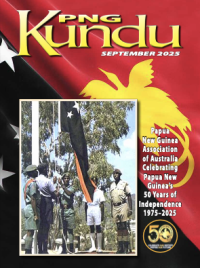Vale June 2007
AISBETT, Richard (Len) | BURNS, Lexie | CRANE, Brian William | DODD, Raymond Burt | GIBBES, Robert (Bobby) | GWARE, Muttu | OAKLEY, Philip Leslie | ORKEN, Shayla | PINIAU, Samuel | STEVENS, Brian |
Richard (Len) AISBETT (25 February 2007, aged 76)
Born in Scarsdale, Victoria, Len worked for the Commonwealth Bank in Ballarat and Melbourne before applying for and being accepted as a Cadet Patrol Officer in 1951. After a short course at ASOPA, he was posted to the Namatanai (New Ireland district). From there he was posted to Balimo, Western District. In 1956 whilst on a one year course at ASOPA in Sydney he met and married Margaret. In 1957 he was posted to the Sepik where he was stationed at Vanimo, Telefomin, Aitape and Angoram, before going to Mt Hagen where he was stationed until 1972. His final posting was to Port Moresby where he was seconded to the Prime Minister’s Department as Assistant Secretary, Management Services.
Len and Margaret returned to Australia to live in 1976 and settled in Geelong. In 1977 Len joined Millers Rope works and was to see several takeovers before he retired as the Personnel and Industrial Relations Manager with Boral/Kinnears, on his 60th birthday. Len is survived by his wife Margaret and three daughters, Lynn, Cathy and Karen. Karen Aisbett
Lexie BURNS (25 March 2007)
Port Moresby, died Bribie Island north of Brisbane – no further details available.
Brian William CRANE (16 May 2007, aged 76)
After 5 years service in Victoria Police, joined RPNGC on 14 March 1955, as Sub Inspector serving at Lae. The onset of severe malaria caused him to resign on 19 April 1956, following which he joined the Australian Army separating some years later as a Warrant Officer. He then went into business and worked many years as a consultant, before branching out into becoming a specialist in militaria, coins and medals. He was a member of PNGVR and in later years a researcher for the PNGVR ex members Association. He leaves a wife, Erma, a son and daughters. Max Hayes
Raymond Burt DODD (24 January 2006, aged 71)
After serving 12 years in Victoria Police, he joined RPNGC as a Sub Inspector on 27 June 1969 on a 12-year contract, this then being the usual contract period for appointments. He served throughout PNG but largely at Rabaul, Lae, Wewak, Mendi and Mt Hagen. He was retrenched on 30 September 1975. On returning to Australia he became a hotel manager and later took up a property at Curra. He leaves a widow, Val, and a daughter. D. Fitzgibbon and Max Hayes
Wing Commander Robert (Bobby) GIBBES, DSO, DFC and Bar, OAM (11 April 2007, aged 90)
For anyone who has done business or had a long term interest in New Guinea, their ability to succeed was more than likely impacted by the pioneering efforts of Bobby Gibbes. It is therefore with great sadness we announce his recent passing. Bobby, as he was known to everyone, died in Mona Vale Hospital, Sydney, three weeks shy of his 91st birthday.
The many obituaries that have been printed since his death speak of a war hero, an adventurer, a pioneer and reveal a life worthy of a Hollywood block buster. The main difference was that Bobby’s exploits were real. Born in country New South Wales in 1916, he spent time in his youth as a jackaroo working the land. When war broke, he was determined to be a fighter pilot. At just over 5 feet tall, he had to cheat his height as he was under the minimum allowed for the air force. His exploits in WWII were well documented – bravery awards of a DSO, DFC and BAR – made him a hero to all of Australia. It was this time in the desert, with makeshift landing strips, constant moving of base that gave him a grounding for his time in PNG. After the war, civilian life in Australia was not his cup of tea. In 1946 he came to New Guinea, saw opportunity and, more importantly for such a daredevil, he saw adventure. He set up Gibbes Sepik Airways (GSA) that serviced both the Sepik and the remote highlands. Over a period of many years, he created airstrips in remote areas – inaccessible and inhospitable. Such was the unregulated, primitive locale that attracted Bobby. The arrival of GSA meant that supply drops to government patrol officers, explorers and locals could be made – the catalyst to the opening up of the highlands. In one of his earliest landings in the highlands, he arrived in a small aircraft with his new wife Jeannie (and his red kelpie Paddy – anyone who knew Bobby, also knew Paddy Gibbes). Confused by the landing of this enormous silver bird, the natives were amazed. When Bobby emerged from the bird, the men of the tribe carried him off to confirm he was one of them. Satisfied this animal was a man, they scoured the plane to establish its sex – what sort of bird was this? He sold GSA in the late 50s to Mandated Airlines. His next venture was coffee. As a pioneer in coffee, tea and other farming pursuits, he created the infrastructure for agricultural businesses to thrive in the highlands. He was always innovative and while others were battling with fuel-driven devices, he used the gravity flow of water to drive a generator to power his coffee factory. Bobby was committed to the development of PNG and, by passing his knowledge and expertise to the local tribes, he helped educate and advance the native population. He raised a family there, making a home with Jeannie and their two daughters on their coffee plantation between Goroka and Mt Hagen. In the mid 60s, he moved into hospitality with the conversion of his house into the first hotel in the region. The Bird of Paradise Hotel in Goroka remains today one of the key hotels of the region. He was the founder of Tourist Hotels of New Guinea and remained active on the board for many years. Bobby thrived on “No, it can’t be done”. It just made the challenge more inviting. At his funeral service in Sydney, his wife Jeannie quoted long time friend and supporter Sid Neilsen who said of Bobby: “He tackled things that no sensible man would.” Jeannie added, “and he was always successful”. The stories of Bobby will be told and retold for years. In 2004, he was awarded the Order of Australia medal for his services to New Guinea – an accolade well overdue. In 1980, he was honoured on the Australian TV program This is Your Life. His surprise guest was Poppa, the Gibbes’ houseboy for over 25 years. Poppa spoke of the drums that told him he had to go to Australia for Master Bob. The drums again will be talking of Masta Bob – such was his impact and respect. He is survived by Jeannie his wife of 62 years, daughters Julie and Robyn, and five grandchildren. Robin and Greg Apps
On the website for the “Spitfire Association” there is a very detailed account of Bobby Gibbes’ outstanding wartime exploits that can be viewed HERE
Muttu GWARE, OBE (6 May 2007 aged 72)
A Paramount Chief, Muttu was Chairman of Ahi Holdings, the business entity of the Butibum, Hengali, Kamkumung, Yanga, Wagang and Yalu villages. Muttu was Papua New Guinea’s first national newspaper journalist and was noted for writing the country’s first Tok Pisin newspaper, Nu Gini Tok Tok, whilst working for the New Guinea Times Courier. A wing at the ANGAU Memorial Hospital in Lae is named in honour of the contribution of Muttu’s father to the health sector in Morobe Province, PNG. Info from the Post Courier, 8 May 2007
Philip Leslie OAKLEY (26 May 2006, aged 82)
Philip was born in Worcester in England and migrated to Australia with his parents as a small child, completing his education at Scots College in Sydney. He finished school during the Second World War and joined the RAAF soon after. Following on from his initial training he was posted to Number 10 squadron to serve on Sunderland flying boats based in Plymouth on the south coast of England. After the war Phil joined Qantas and applied to go to Papua New Guinea in 1947 he was seconded to the Australian Petroleum Company operating the Grumman Widgeon VH-AZ0. He flew around the western areas of Papua for several years until he returned to Qantas to fly the Catalina service on the coast to Rabaul and the islands. In 1957 he was posted to Lae to fly the DC-3 aircraft and was appointed Chief Pilot in 1958.
When TAA took over the Qantas operations in PNG in 1960 he returned to Sydney before being seconded to Fiji Airways for a short time, where he filled the role of Operations Advisor. Following on from his time in Fiji he flew for Qantas eventually converting to fly the Boeing 707 which he flew until they were phased out of operation in the late 1970s. He retired from Qantas in 1979.
Phil married Nance Sefton in Port Moresby in 1948 and a daughter Pamela and son Christopher were born in due course. He flew for 13 years in PNG and grew to love the country in his time there. He was proud to receive an award recognising his service to the country on the 25th anniversary of Independence.
Phil is survived by his wife Nance, daughter Pamela and son Christopher. Chris Oakley
Shayla ORKEN (28 March 2007, aged 84)
Shayla was born in far north Queensland. In late 1941 she commenced nursing training at Darwin Hospital and there survived the trauma of the Japanese bombing. She joined the PNG Health Department in 1951 and was posted to Rabaul. In 1953 she married Max Orken, ADO at Rabaul, and their son, Keith James, was born in 1954. The family was posted to Goroka in 1958. Shayla then spent some years in Brisbane until Keith was old enough to commence boarding school. She returned to Goroka in 1965 and worked as Sister in charge of Casualty and Outpatients at Goroka Base Hospital, then as School Health Nurse and finally as District Supervisor Community Health, Eastern Highlands District. The family retired to SE Queensland in 1973. Shayla continued her nursing career at the Woorabinda Aboriginal Settlement and the Greenvale Nickel Mine. In later years she was actively involved with the Older Womens Network and in political and environmental issues. She is survived by her son Keith and four grandchildren. Ken Hanrahan
Samuel PINIAU, OBE (1941-2007, aged 67)
Samuel Piniau, from Rakatop village near Kokopo, was the founding Chairman of the National Broadcasting Corporation of PNG. The son of a pastor in the Gazelle Peninsula, Sam had a brilliant career and a very full life. He was a strong advocate of media freedom and impartiality in broadcasting, even when there was almost irresistible political pressure. His life story is told in more detail on page 23 of the June 2007 issue of Una Voce.
His first wife Atu predeceased him. He is survived by his second wife, Dulcie, and six children – Guise, Aarol, Evah, Gladish, Dianna and Sam Junior – and five grandchildren. His funeral service at Rakotop was attended by 700 people. Keith Jackson, AM
Brian STEVENS (3 April 2007)
– no further details available.



